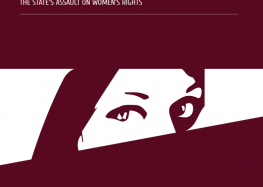The Plan to Promote Virtue and Prevent Vice
Since the election in June 2013 of Hassan Rouhani, who campaigned on a platform that included the promotion women’s rights, the Iranian Parliament has moved forward on a number of pieces of legislation that seek to impose ultraconservative notions of female piety on the population. The most far-reaching of these is the Plan to Promote Virtue and Prevent Vice.
In June 2014, Iranian MPs took up for consideration the Plan to Promote Virtue and Prevent Vice. It calls for all citizens to take it upon themselves to promote “virtue” and prevent “vice” by “heart, verbal, written, and practical action.” The Plan is startlingly vague in its delineation and expansive in its scope: it requires any action, and forbids any inaction, regarding the implementation of Shari’a law. It “invites” and in fact “forces” the citizenry to promote “virtuous acts” and prevent “forbidden” ones.
The one behavior the plan singles out as an example of the “virtue” that must be promoted is female adherence to correct hijab. Article 17, which requires the establishment of a Committee responsible for implementing the Plan, is followed by Note 1, which states: “The Committee is obligated to follow up on implementing regulations adopted by the Supreme Cultural Revolution Council regarding hijab and chastity.”
While Article 5 forbids the violation of the “life, property, residence, workplace or private space of others unless a judicial authority allows it,” an Amendment to this article states, “Areas that are in plain view of the public, such as some parts of apartments, hotels, hospitals, and vehicles, are not considered private.” No less than four of the Plan’s articles—Articles 6, 7, 8, and 10—explicitly call for the judicial protection of enforcers of the Plan. Yet there is no similar provision for the protection of the targets of such enforcement.
The subjectivity of such legislation, and the imposition of an extremely conservative social and cultural world view on all citizens of Iran would be enough cause for concern, but most troubling is the Plan’s explicit designation of the Basij for the enforcement of the Plan. The Plan states: “The Basij Organization is required to employ all Basij members within the framework of the communicated policies of the Supreme Council to establish the culture and to implement Promotion of Virtue and Prevention of Vice in the verbal stage.” An Amendment explicitly states: “This article does not deny the judicial responsibility of Basij members to take actions toward implementation.” A number of high-level clerics have publicly stated that effective enforcement must in fact go beyond verbal warnings. (See the Public Statements section of this report.) This aspect of the bill effectively entrusts law enforcement to untrained (and unaccountable) individual citizens—in other words, it creates a system of vigilante justice.
Although the Plan has not yet reached full and final approval, it continues to advance through the legislative process. After review in a joint committee comprised of the Parliament’s Cultural Committee and the Judicial Committee, the Plan was passed by the committee, but it has not yet been voted on in the general floor of Parliament. On January 3, 2015, the Guardian Council announced that they had several objections to aspects of the Plan they viewed as ambiguous and sent it back to Parliament. On January 11, a member of the Cultural Committee announced that the joint committee had been meeting with members of the Guardian Council to address their objections to the Plan and were working on revisions that would allow it to be brought to the floor of Parliament for a vote in the near future. As of February 3, the Plan moved back to the full floor of Parliament and the MPs began voting on the various articles of the Plan; several of them have been approved.




